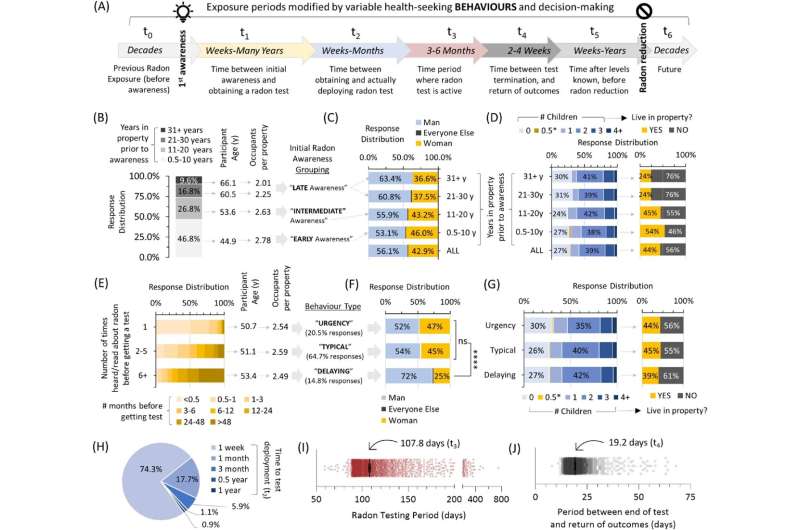Study finds behavior matters far more to lifetime exposure to cancer-causing radiation than previously believed

A new multi-disciplinary study including researchers at the University of Calgary shows that people who act quickly to test for and mitigate radon gas in their homes are at a much lower risk of developing lung cancer long-term.
The study found swift action is key in avoiding preventable illness. In new work conducted by a collaborative team of Canadian psychologists, biologists and cancer experts, researchers found that our behavior matters far more to lifetime exposure to cancer-causing radiation than previously believed. While some of these behavioral and lifestyle factors can be easily altered, others represent major challenges.
The study, published in Scientific Reports, found that people who act quickly to learn about, test for, and reduce exposure to radioactive radon gas in their homes could reduce their lifetime risk of lung cancer by as much as 40 percent, compared to those who do not. In extreme cases, behavioral differences meant a difference of decades of exposure to radiation levels exceeding those normally only seen after a nuclear accident. Researchers found that some Canadians are absorbing more than 100 millisieverts—the unit used to measure radiation doses—of radiation to their lungs per year just from the air of their own homes.
"To put this into perspective, these are radiation doses known to have caused cancer after the Chernobyl accident. This could explain why, even though Canadian tobacco use is amongst the lowest in the world, our rates of lung cancer diagnosis and death are amongst the highest," says Dr. Aaron Goodarzi, Ph.D., lead researcher of Evict Radon, a national multi-year study of the cancer-causing gas in Canadian homes and strategies to mitigate risk.
Radioactive radon gas is the leading cause of lung cancer in non-smokers, representing between one in five to as many as one in three lung cancer cases in Canada. Smokers are in danger too, as radon exposure multiplies lung cancer risks from tobacco. Impacted individuals typically—and often unwittingly—absorb high doses of dangerous 'alpha particle' radiation in their lungs from radon gas exposure in their homes over many years prior to lung cancer diagnosis.
Socio-economic factors linked to impact
This study determined that lifetime exposure to radioactive radon is not simply dictated by the level of radon gas in a home, but is significantly affected by human behavior and socio-economic factors associated with the detection and response to the presence of radon.
The researchers determined that, for a variety of reasons including economic barriers and delaying behaviors, three in five Canadians continue to live in homes with known high radon, despite being aware of the associated health risks. Half of those exposed to dangerous levels of the cancer-causing gas ignore or delay addressing the problem, while others can't afford to fix it. It is important to recognize that high radon in a home can be permanently reduced to safe levels, typically requiring two days work.
Study co-lead Dr. Linda Carlson, Ph.D., says the research also raises questions about the lack of access to community radon testing and reduction services.
"Requiring individuals to be entirely responsible for testing and mitigating radon in their homes is increasing lung cancer health disparities, especially for low-income families. We need more system-wide solutions from policy makers and authorities," says Carlson, a professor in the Cumming School of Medicine (CSM) and Faculty of Arts at UCalgary.
The research also indicates that speed is key to avoiding health risks from radon exposure, but that it is never too late to act. For example, those who had lived in high radon households for many years were able to 'stop the clock' on future risk by mitigating their radon exposure quickly. In time, this action reduced their long-term risk of lung cancer from radon to levels comparable to those who had always lived in a low or safe radon property.
The study also determined that radon mitigation in Canada is a highly effective tool that people can use to reduce their lifetime risk of lung cancer. The researchers found that people living in homes with high levels of radon that were later made safe through mitigation went on to experience the lowest possible rates of radon exposure. They became so far below the Canadian and global average of exposure as to essentially eliminate this as a health risk factor.
"Economic barriers to solving the radon problem in Canada are real and substantial. One in three people in high radon households cannot afford to fix the problem," says Dr. Cheryl Peters, Ph.D., a study co-author. "This work also highlights a new health equity issue for Canada as, at present, people who do not smoke but who are exposed to high levels radon would not qualify to be included in the lung cancer screening programs emerging across Canada."
"Health-seeking behaviors matter," says Goodarzi. "We owe it to ourselves and our loved ones to learn about radon, to test where we are living and, if radon is found to be high, to do what needs to be done to reduce our exposure as fast as possible."
More information: Jesse L. Irvine et al, Social factors and behavioural reactions to radon test outcomes underlie differences in radiation exposure dose, independent of household radon level, Scientific Reports (2022). DOI: 10.1038/s41598-022-19499-5

















